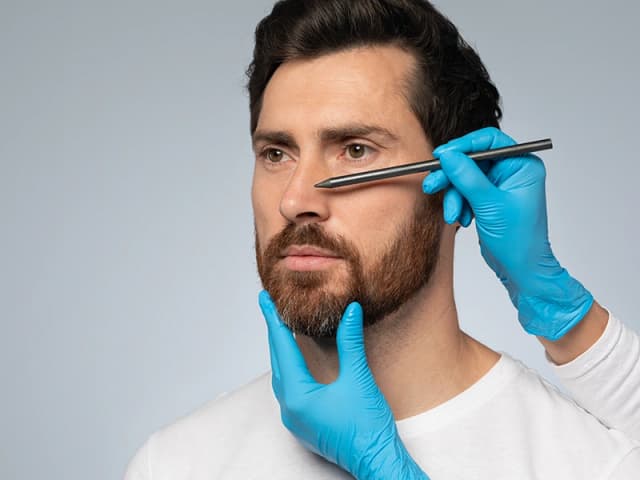Deciding to enhance your appearance through facial and plastic surgery procedures is a big step, and who you choose to trust with this transformation is even bigger. Should you go with a general physician or a plastic surgeon? In this article, we’ll share important factors to consider when making your decision and explain key differences between the two professions.
What is the Difference Between a Plastic Surgeon and a General Physician?
Think of it this way: if your car needed some serious repairs, would you take it to a general mechanic or someone who specializes in your specific car model? The same logic applies to choosing between a plastic surgeon and a general physician. Plastic surgeons are the specialists of the medical world when it comes to cosmetic and reconstructive surgery.
They have spent years in medical school followed by specialized training focusing exclusively on techniques that perfect and enhance the human body. Being a board-certified plastic surgeon also means they have passed numerous rigorous exams, proving expertise in their field.
Factors to Consider When Choosing Between a Plastic Surgeon and General Physician
When deciding who should handle your cosmetic needs, several factors can guide your choice between a general physician and a specialist (plastic surgeon). For example, Dr. Farhad Ardesh, also known as The Mole Doctor and The Beauty Mark Doctor, holds double board certifications in facial plastic and reconstructive surgery. His expertise is highly sought-after in rhinoplasty, facial rejuvenation, and mole removal. Additionally, Dr. Ardesh offers signature treatments – Ardesh Refresh and Ardesh Chisel – further establishing his role as a leader in cosmetic enhancement and patient care.
When choosing between a plastic surgeon and a general physician, here are key considerations to keep in mind:
-
Board Certification: This is crucial. Board certified plastic surgeons have undergone specific exams and training that certify their expertise in cosmetic plastic surgery. This is a guarantee of their proficiency that general physicians typically do not have. Additionally, knowing what specific board certification a surgeon holds is important. For example, board certified plastic surgeons are certified by the American Board of Facial Plastic Surgery, which includes training in both cosmetic and reconstructive procedures.
- Scope of Practice: General physicians typically have a broader, less specialized medical training, which often excludes the intricate, detailed techniques involved in plastic and cosmetic surgery. While they can perform basic medical treatments, they do not possess the specialized training that cosmetic surgeons receive for procedures aimed specifically at enhancing your aesthetic appearance.
- Experience in Cosmetic Surgeries: Unlike plastic or cosmetic surgery specialists, general physicians usually have limited experience in performing cosmetic surgeries. This is because their training and practice are not focused on cosmetic enhancements, which means they might not have the same level of skill and experience in performing such specialized and delicate procedures as frequently or as expertly as a cosmetic plastic surgeon.
- Specialty of the Surgeon: Cosmetic plastic surgeons often have a much more specialized focus on the aesthetics of surgery compared to general physicians, which can be beneficial if one of your primary concerns is the visual outcome of the procedure.
Benefits of Choosing a Plastic Surgeon Over a General Physician
Choosing a plastic surgeon offers specific advantages that go beyond general medical care. Here’s why you might consider a plastic surgeon:
- Specialized Surgical Expertise: Plastic surgeons are extensively trained in cosmetic procedures.
- Artistic Precision: They possess a keen eye for aesthetics essential for successful cosmetic surgery.
- Advanced Techniques: They are equipped with the latest techniques and knowledge in the field of aesthetic plastic surgery.
- Safety and Standards: Higher standards of care in surgical environments designed specifically for cosmetic surgery.
- Personalized Consultations: Detailed consultations to align surgical outcomes with patient expectations.
- Comprehensive Care: Ability to handle complex reconstructive procedures due to specialized training.
What Can a Plastic Surgeon Help With?
A plastic surgeon can perform a wide range of procedures that enhance and transform your appearance. Here are some examples:
- Facelifts: Reduce signs of aging, and enhance facial contours.
- Rhinoplasty: Nose reshaping for aesthetic or functional improvement.
- Eyelid Surgery: Corrects drooping eyelids, and removes puffiness.
- Brow Lift: Raises the eyebrows, and reduces forehead lines.
- Neck Lift: Tightens loose neck skin, and improves jawline definition.
- Mole Removal: Removes many sizes of moles with minimal to no scarring.
- Lip Augmentation: Enhances lip volume and shape.
- Ear Surgery: Reshapes the ear, and corrects defects from birth or injury.
- Skin Resurfacing: Improves texture, and treats scars and wrinkles.
- Chin Surgery: Modifies the chin to better fit facial proportions.
- Reconstructive Surgeries: Corrects defects from trauma, birth, or disease.
Choosing a plastic surgeon means putting your trust in someone who has dedicated their entire career to mastering the art and science of cosmetic and reconstructive surgery. It’s about getting the best possible care and the most beautiful results. So, when considering your options, remember that the specialist touch of a board-certified plastic surgeon can make all the difference in your cosmetic journey.
Schedule Your Consultation
Dr. Ardesh sets a new standard in quality plastic surgery, bringing high-level talents to the art. He consistently achieves superior results that appear fresh, natural, and appealing. A double board-certified plastic surgeon, he offers an exceptional level of experience in delicate procedures.




